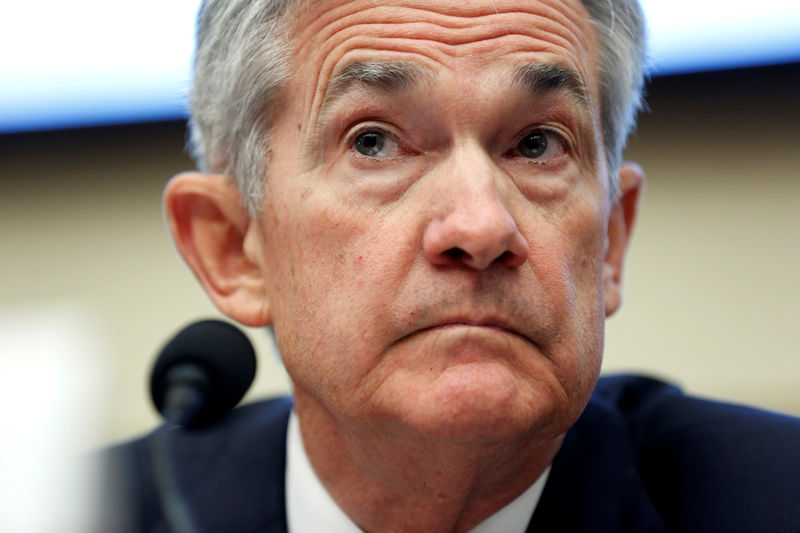Five things to watch in markets in the week ahead
By Noreen Burke
Investing.com -- It’s going to be a big week for central banks, with the Federal Reserve widely expected to deliver a second 50 basis point rate hike on Wednesday. Investors will be watching closely to see what Fed Chair Jerome Powell has to say about future rate hikes after Friday’s much stronger than expected inflation data. The Bank of England is expected to deliver a fifth consecutive rate hike amid a mounting cost of living crisis. The Bank of Japan and the Swiss National Bank will also hold policy meetings. U.S. retail sales data will give an insight into whether inflation is eroding households' spending power and equity markets look set for another turbulent week. Here’s what you need to know to start your week.
- Fed to hike again
The Fed is all but certain to raise interest rates by another 50 basis points on Wednesday, adding to the 75 bps of rate hikes already delivered since March.
A further half-percentage-point is priced in for July, with a strong chance of a similar move in September but this is less clear cut.
Friday’s hot May inflation data has revived fears that Powell could flag a faster pace of future rate hikes. Investors are concerned that an aggressive push higher on rates by the Fed could tip the economy into recession.
Market watchers will be keeping a close eye on Powell’s press conference after the policy meeting and on the Fed’s updated economic forecasts and its “dot plot”, which shows the projected outlook for interest rates.
- BoE to deliver 5th straight rate hike
The BoE is widely expected to deliver what will be its fifth consecutive 25 bps rate hike since December on Thursday, despite a growing number of global central banks opting for half-point hikes.
The BoE was the first major central bank to start reversing its pandemic stimulus back in December but that did not stop U.K. inflation hitting a four-year high of 9% in April, almost five times the BoE's 2% target.
The BoE expects inflation to exceed 10% later this year and Governor Andrew Bailey said in April the bank was walking a very tight line between tackling the surge in inflation and causing a recession.
It’s also a busy week for U.K. economic data, starting with GDP figures for April on Monday, which are expected to be flat. Employment data on Tuesday is expected to point to continued tightness in the labor market, with unemployment expected to decline while wage gains accelerate.
- BOJ, SNB to meet
The BOJ meets Friday and is widely expected to stick to its ultra-easy monetary policy stance, but pressure to change tack is growing with widening yield differentials pushing the yen to multi-decade lows, adding to inflationary pressures.
The SNB is not expected to make a change to its -0.75% interest rate - the world's lowest – when it meets on Thursday. But with Swiss inflation hitting the highest in 14 years in May and the prospect of the European Central Bank hiking rates in July, a shift towards rate hikes may finally come about.
Meanwhile, ECB President Christine Lagarde is to make what will be a closely watched speech Wednesday after saying last week that the ECB would next month deliver its first rate hike since 2011, followed by a potentially larger move in September.
- U.S. data
The U.S. is to release data on retail sales for May on Wednesday which are expected to slow amid weaker auto sales. Numbers on industrial production, due out on Friday, are also expected to slow but remain solid.
The economic calendar also features a report on producer price inflation on Tuesday, along with data on initial jobless claims and housing starts on Thursday.
Data on Friday showed that U.S. consumer inflation jumped by 8.6% year-over-year in May, its biggest gain since 1981 with gasoline marking a record high and the cost of food soaring.
Soaring price pressures are forcing consumers to change their spending habits, fueling fears of a recession.
- Stock market volatility
U.S. stocks recorded their biggest weekly percentage declines since January and ended sharply lower on Friday after the May inflation report put paid to hopes that price pressures may have peaked.
Stocks have fallen for most of the year amid worries over inflation, rising interest rates and the likelihood of a recession.
Market declines had partially reversed over the last few weeks on hopes that a potential peak in inflation would allow the Fed to turn less aggressive later this year.
"Given that price pressures in the U.S. show little sign of easing, we doubt that the Fed will take its foot off the brakes anytime soon," analysts at Capital Economics wrote on Friday. "We therefore suspect that more pain is yet in store for U.S. asset markets, with Treasury yields rising further and the stock market remaining under pressure."
--Reuters contributed to this report
